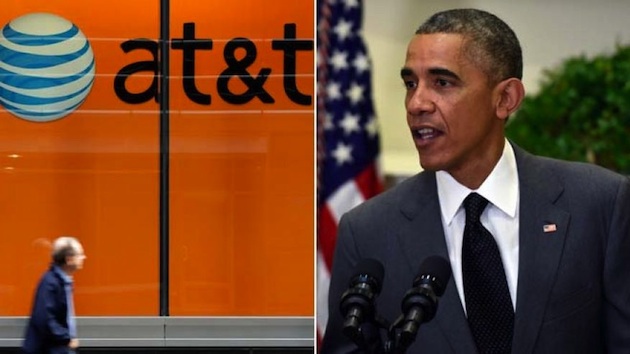

AT&T store on New York’s Madison Avenue, left, and President Barack Obama on Saturday, Nov. 8, 2014, in the Roosevelt Room of the White House in Washington, right. (Photo: AP)
In mid-November, President Obama announced his push for the policy of net neutrality, which consists of the FCC regulating the Internet under Title II of the Communications Act. The move would reclassify broadband providers as “common carriers,” such as the case with telegraph and old-style telephone services, which proponents argue is necessary to protect consumers and innovators.
From what? Obama and advocates say consumers need protections from Internet service providers who otherwise would block their access to websites, certain broadband services and other applications. Ironically, they also claim deregulation stifles innovation and suppresses political speech, which are the exact concerns raised by opponents.
However, according to a recently released report by the right-leaning think tank Heritage, marketplace abuses cited by Obama and supporters basically don’t exist. Further, if the FCC continues to implement such regulations, they will cause the very same harm they claim to prevent and hurt the very same people they claim to protect.
The study, which is entitled Beyond Hypothetical: How FCC Internet Regulation Would Hurt Consumers, FCC regulations will not cut costs for consumers, “keep the Internet the way it is” or allow innovation to flourish, but rather it would limit the Internet to the speed of regulation, denying millions of Americans the full potential of the Internet.
“The reality of net neutrality regulation would be a far cry from the Internet utopia envisioned by those who want to hand government greater control of the net,” said James Gattuso, Senior Research Fellow at Thomas A. Roe Institute for Economic Policy Studies at The Heritage Foundation.
“We found that most of the practices that have been identified by regulation supporters as activities that should be prohibited are in fact beneficial to consumers or are conducted by challengers in the marketplace, rather than by the big, dominant firms.”
The study found that the impact of regulation would vary greatly depending on the exact rules the Federal Communications Commission implement. However, regardless, the common thread is that FCC interference in the Internet marketplace would hurt the very consumers regulation advocates claim to protect.
In most cases, net neutrality rules were either unnecessary or sought to limit innovative business practices by smaller firms, rather than abuses by the big guys. Even worse, the rules would shift additional costs back to consumers and away from companies through bans on sponsored-data plans and other pro-consumer practices.
Take, for instance, a plan by Sprint (the distant third-place wireless carrier) to give its low-cost subscribers—who are unlikely to pay for expensive data plans—free access to Facebook, as well other social media apps for a small fee. But instead of praising Sprint for bringing connectivity to this segment of the market, net neutrality advocates called for regulations that would ban the practice because it supposedly favored Facebook (the most popular social network) over other sites. Do these regulations really help consumers if they would block low-income users from gaining access to Internet applications?
The American people haven’t bought the president’s argument that he and bureaucrats at the FCC have their best interests at heart, according to a recent survey. The vast majority of Americans don’t believe the government should fix the Internet, and believe the Obama’s net neutrality plan is all about government control, as just 26 percent of American adults agree the Federal Communications Commission should regulate the Internet like it does radio and television.
Further, 61 percent think the Internet should remain free of government regulation and censorship, and 68 percent are concerned that if the FCC does gain regulatory control over the Internet, then the government will abuse the power and attempt to control online content, or promote a political agenda. A whole 44 percent plurality are “very concerned.”
Critics also point to the president’s previous plan to use the FCC to conduct the infamous newsroom study, which was an effort to place agency officials in private organizations to monitor stories and editorial decisions. It received considerable blowback leading the president to abandon the idea, though Judicial Watch filed a FOIA lawsuit recently to ensure the administration kept its promise.
While concern unsurprisingly increases among those who use the Internet more, all age groups say they are perfectly happy with their Internet services and want the government to stay out of the Internet business, including Internet taxes. Most Americans — 63 percent — disagree with the idea of government taxing business on the Internet.




sleepd / December 13, 2014
Pure and utter bullsh1t. And really? A “study” from the Heritage Foundation? Embarrassing for you.
/